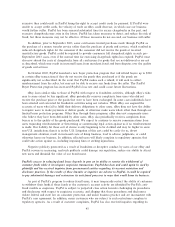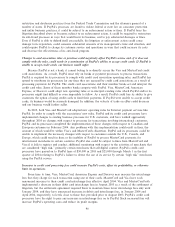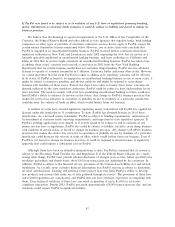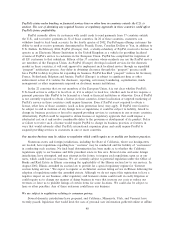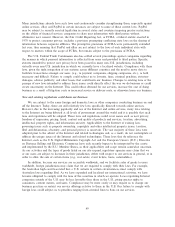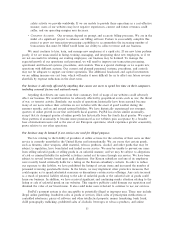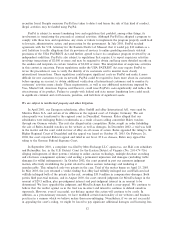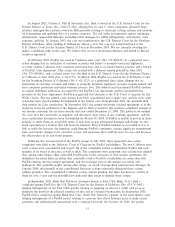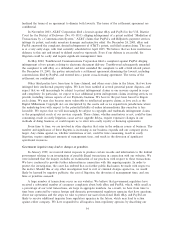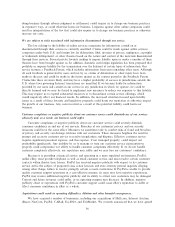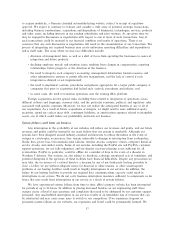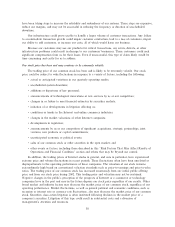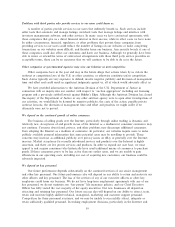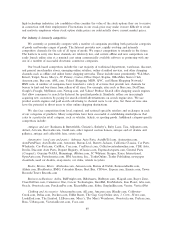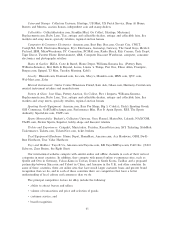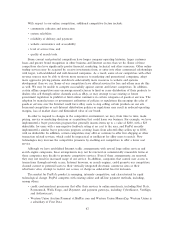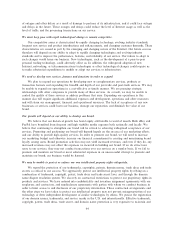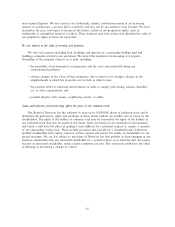eBay 2003 Annual Report Download - page 57
Download and view the complete annual report
Please find page 57 of the 2003 eBay annual report below. You can navigate through the pages in the report by either clicking on the pages listed below, or by using the keyword search tool below to find specific information within the annual report.current and planned antifraud eÅorts, customer support procedures and operating procedures. If one or
more of these agencies is not satisÑed with our response to current or future inquiries, we could be subject
to Ñnes or other penalties, or forced to change our operating practices in ways that could harm our
business.
We are subject to laws relating to the use and transfer of personally identiÑable information about our
users and their transfers, especially outside of the U.S. Violation of these laws, which in many cases apply
not only to third-party transfers but also to transfers of information between ourselves and our subsidiaries,
and between ourselves, our subsidiaries, and other parties with which we have commercial relations, could
subject us to signiÑcant penalties and negative publicity and could adversely aÅect us.
Our business is subject to online commerce security risks.
To succeed, online commerce and communications must provide a secure transmission of conÑdential
information over public networks. Our security measures may not prevent security breaches that could
harm our business. Currently, a signiÑcant number of our users authorize us to bill their credit card
accounts directly for all transaction fees charged by us. PayPal's users routinely provide credit card and
other Ñnancial information. We rely on encryption and authentication technology licensed from third
parties to provide the security and authentication technology to eÅect secure transmission of conÑdential
information, including customer credit card numbers. Advances in computer capabilities, new discoveries
in the Ñeld of cryptography or other developments may result in a compromise or breach of the technology
used by us to protect customer transaction data. A number of websites have reported breaches of their
security. Any compromise of our security could harm our reputation and, therefore, our business. In
addition, a party who is able to circumvent our security measures could misappropriate proprietary
information or cause interruptions in our operations.
Our servers are also vulnerable to computer viruses, physical or electronic break-ins, and similar
disruptions, and we have experienced ""denial-of-service'' type attacks on our system that have made all or
portions of our websites unavailable for periods of time. We may need to expend signiÑcant resources to
protect against security breaches or to address problems caused by breaches. These issues are likely to
become more diÇcult as we expand the number of places where we operate. Security breaches could
damage our reputation and expose us to a risk of loss or litigation and possible liability. Our insurance
policies carry low coverage limits, which may not be adequate to reimburse us for losses caused by security
breaches.
In addition, our users, as well as those of other prominent Internet companies, have been and will
continue to be targeted by parties using fraudulent emails to misappropriate passwords, credit card
numbers, or other personal information. These emails appear to be legitimate emails sent by eBay or
PayPal, but direct recipients to fake websites operated by the sender of the email or request that the
recipient send a password or other conÑdential information via email. We actively pursue the parties
responsible for these attempts at misappropriation and encourage our users to divulge sensitive information
only after they have veriÑed that they are on our legitimate websites, but we cannot entirely eliminate
these types of activities. In addition to harming our users, these fraudulent emails may damage our
reputation, reduce our ability to attract new users to our websites, and diminish the value of our brand
names.
Our business may be harmed by the listing or sale by our users of pirated or counterfeit items.
We have received in the past, and we anticipate receiving in the future, communications alleging that
certain items listed or sold through our service by our users infringe third-party copyrights, trademarks and
tradenames, or other intellectual property rights. Although we have sought to work actively with the
content community to eliminate infringing listings on our websites, some content owners have expressed
the view that our eÅorts are insuÇcient. Content owners have been active in defending their rights against
online companies, including eBay. Allegations of infringement of intellectual property rights have resulted
in litigation against us from time to time. Such litigation is costly for us, could result in increased costs of
55


